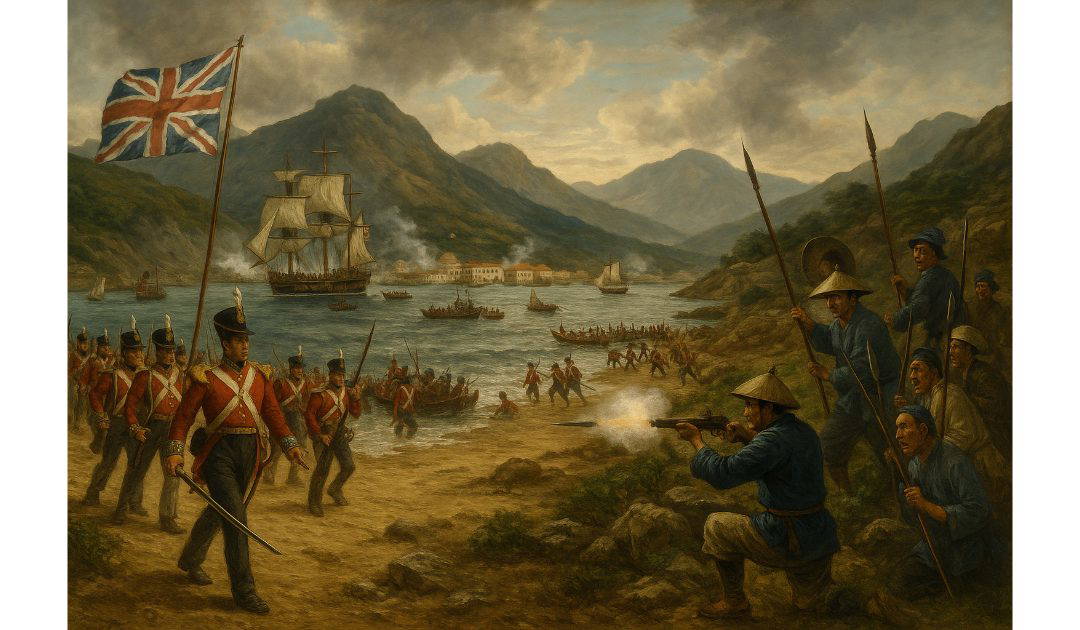Being British I am perhaps drawn to historical events in which we take pride, Waterloo, Trafalgar, the defeat of the Spanish Armada, etc. So for a change here’s one we can be thoroughly ashamed of. Wikipedia tells me that on the 23rd of August, 1839, Britain seized Hong Kong in preparation for the First Opium War with China.
The First Opium War, fought between 1839 and 1842, was a pivotal conflict that marked the beginning of the era of unequal treaties and Western imperial dominance in China. The war was primarily between the British Empire and the Qing Dynasty of China, sparked by disputes over trade, particularly the British trade of opium, and China’s sovereignty.
Background and Causes
By the early 19th century, the British had developed a strong appetite for Chinese goods such as tea, porcelain, and silk. However, China had little interest in British manufactured goods, leading to a significant trade imbalance. To counter this, the British East India Company began exporting opium from India to China. Opium, a highly addictive narcotic, quickly became widespread in China, leading to severe social and economic problems.
The Qing government recognised the detrimental effects of opium on its population and economy. In 1839, the Daoguang Emperor appointed Lin Zexu as a special commissioner to Guangzhou (Canton) to eradicate the opium trade. Lin took strong actions, including the confiscation and destruction of over 20,000 chests of opium. This assertive stance angered British traders and, ultimately, the British government, as their economic interests were directly threatened.
The Outbreak of War
The destruction of the opium and the refusal of the Qing government to compensate British merchants led to escalating tensions. Britain, determined to protect its commercial interests and assert its influence, deployed naval forces to China. In 1839, hostilities broke out, marking the beginning of the First Opium War.
The British military, with its advanced naval technology and well-trained forces, held a significant advantage over the Qing forces, who were less technologically developed and poorly coordinated. The British strategy focused on blockading key Chinese ports and capturing strategic coastal cities to pressure the Qing government into submission.
Major Battles and Events
One of the first major engagements was the Battle of Chuenpi in 1839, where British forces decisively defeated Chinese defences. The British continued their campaign along the coast, capturing important cities such as Ningbo and Zhoushan. The superior firepower and discipline of the British troops were evident in battles like the Second Battle of Chuenpi and the Battle of the Bogue, where Qing forces suffered heavy losses.
The British eventually advanced towards the Yangtze River, threatening the economically vital region around Nanjing. The Qing government, facing internal unrest and unable to repel the British forces, realised the dire situation and sought peace negotiations.
The Treaty of Nanjing
The war concluded with the signing of the Treaty of Nanjing in 1842. This treaty was the first of the so-called “unequal treaties” that favoured Western powers and severely undermined China’s sovereignty. Key provisions included:
- Cession of Hong Kong: The island of Hong Kong was ceded to Britain, establishing a significant colonial foothold.
- Opening of Ports: Five Chinese ports, including Guangzhou, Xiamen, Fuzhou, Ningbo, and Shanghai, were opened to British trade and residence.
- Indemnity Payments: China agreed to pay a large indemnity to Britain to cover the costs of the war and the destroyed opium.
- Extraterritorial Rights: British citizens in China were granted extraterritorial rights, meaning they were subject to British, not Chinese, laws.
Impact and Legacy
The First Opium War had profound and lasting effects on China and the wider world. It marked the start of what is often referred to as the “Century of Humiliation” for China, a period characterised by foreign domination and internal strife. The war exposed the vulnerabilities of the Qing Dynasty, leading to a loss of confidence in the government and contributing to internal rebellions, such as the Taiping Rebellion.
Internationally, the war signalled the rise of Western imperialism in Asia. The unequal treaties established a pattern of foreign powers carving out spheres of influence within China, exploiting its resources and markets. This period significantly altered the balance of power in East Asia.
For Britain, the war was a demonstration of naval and military superiority, reinforcing its position as a dominant global empire. The acquisition of Hong Kong would later prove to be of immense strategic and economic value.
Conclusion
The First Opium War was more than just a conflict over trade; it was a clash of civilisations, ideologies, and economic interests. It highlighted the devastating impact of opium on Chinese society, the aggressive pursuit of imperial interests by Western powers, and the fragility of the Qing Dynasty. The war set the stage for subsequent conflicts, including the Second Opium War, and reshaped the geopolitical landscape of Asia for generations to come.

